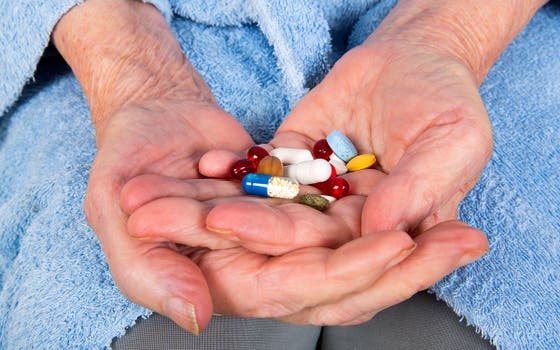Help older people better with their medication intake

A breakfast plate full of pills for various chronic diseases. That is the daily routine for many older people in particular. And that does not always go well, sometimes resulting in hospitalization or even death. Research by Vivianne Sloeserwij at the UMC Utrecht shows that specially trained pharmacist-pharmacotherapists in general practice can play a major positive role in this. She was awarded a PhD for her research on November 24th.
Earlier research a few years ago showed that about ten percent of acute hospital admissions of vulnerable elderly people in the Netherlands are related to medication use. Almost half of them could be prevented. “And hospitalizations are the serious situations. Much more commonly, the treatment of these patients is not optimal because they either take too much or too little medication. They may also suffer from unpleasant side effects, which may even not be necessary.” The increasing ageing of the population and the increasing complexity of the healthcare for this group of patients will only exacerbate this problem in the future.
Personal guidance
Following similar initiatives in England, Canada and Australia, the Netherlands launched the POINT study in 2014, investigating a new healthcare model, in which a pharmacist-pharmacotherapist works in a general practice, without a pharmacy. Nine pharmacist-pharmacotherapists were trained for the study, and together with the general practitioner they personally supervised patients with their medication. In addition, the pharmacist-pharmacotherapists carried out quality projects and provided pharmacotherapy training to the GP team. After the POINT study ended, five of the nine pharmacotherapists continued to work in the general practice. Vivianne examined the added value of this.
At people's homes
A pharmacist-pharmacotherapist working in a GP's practice discusses with patients which medication they are taking and in which dosages. They prefer to do this at people's homes, so that they get an idea of which self-help tools people may be taking on their own initiative. Vivianne: “Sometimes it turns out that the prescribed medication is not being taken or that old medication is still being taken without the doctor's knowledge. It was also found that people sometimes forget to take medication or take it too often. Moreover, people may suffer from unpleasant side effects that could possibly be prevented with another combination of drugs. The pharmacy-pharmacotherapist checks which medication is taken on a daily basis and compares it with the optimal intake. If that doesn't match, they draw up a plan with the GP and the patient on how to improve this and then guide the patient in getting there.”
Fewer hospital admissions
Vivianne's research shows that the added value of pharmacist-pharmacotherapists is significant. “The number of hospital admissions due to misuse of medication alone decreased by thirty percent in the group surveyed. In addition, it turned out that people suffer less from side effects compared to people receiving the usual care.” Whether this new approach is also cost-effective is not clear from Vivianne's research. “It has, however, been researched in England, where it was found that every pound invested yielded more than four pounds.”
Large-scale implementation
Vivianne therefore advocates the large-scale introduction of pharmacist-pharmacotherapists in general practices. There is, however, still a lot of work to be done. Vivianne: “First of all, enough general practitioners and pharmacists should really support this and be committed to it. Moreover, it is of course important that enough pharmacists are trained for this new job. I sincerely hope that my research will provide the impetus to actually improve the guidance of elderly people with multiple chronic diseases.”
